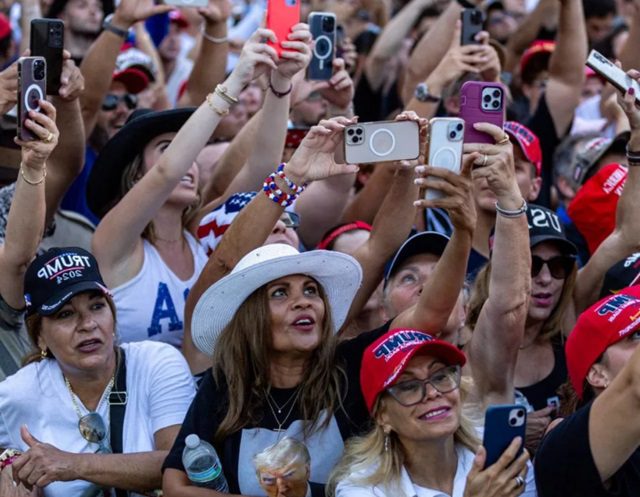BTN News: On a scorching Tuesday, the exiled communities of Cubans, Venezuelans, and Nicaraguans in South Florida gathered in large numbers at Donald Trump’s golf resort in Doral. They marched with enthusiasm, donning MAGA hats and waving Trump banners, despite the 90-degree heat. Trump addressed the crowd, asking, “How many Venezuelans are here tonight? How many Cubans?” This significant support from Miami’s exiles, who fled from communist and socialist regimes, underscores a broader political shift in the area. These communities have become strong supporters of Trump, often facing ridicule and skepticism for their unwavering allegiance.
Background Information
The exiles’ backing of Trump raises a common question: why do those who fled authoritarian leaders like Fidel Castro, Nicolás Maduro, and Daniel Ortega support a president often criticized as a threat to democracy? The answer lies in Trump’s recognition of their fears. He acknowledges their concerns about potential threats to America and does not mock their anxieties. This understanding resonates deeply with the exiled voters, transforming Miami-Dade from a Democratic stronghold to a potential Republican victory zone.
Current Developments
Jaime Florez, the director of Hispanic presidential communications for the Republican National Committee, highlighted this transformation at the Doral rally. He pointed out the diverse crowd of Venezuelans, Nicaraguans, and Cubans, all gathered to support Trump and the Republicans. For many Cubans, Trump’s tough stance against communism and socialism mirrors that of President Ronald Reagan, who famously supported their cause during his visit to Little Havana in 1983. This historical context explains why Trump’s rhetoric, promising a firm stance against regimes like Cuba’s, has such a profound impact.
Analysis and Perspectives
Trump’s previous efforts to pressure Maduro to step down and his sanctions against Ortega’s anti-democratic regime appeal to Venezuelan and Nicaraguan exiles. While the Biden administration has also imposed sanctions on these leaders, Trump’s vocal criticisms and promises of a more aggressive approach if re-elected strengthen his appeal. This direct communication style, where he openly condemns controversial Latin American leaders, contrasts with Biden’s more reserved approach, further endearing Trump to these communities.
Implications and Future Outlook
Trump’s nationalist “America First” stance resonates strongly with Miami’s exiled communities, who are fiercely patriotic towards their adopted country. Years of Republican messaging portraying Democrats as socialists and anti-American have taken root, especially in the absence of an effective counter-narrative from the Democratic Party. This perspective suggests a more assertive U.S. policy against Latin American dictatorships, appealing to voters despite Trump’s inconsistencies in praising other authoritarian figures like Vladimir Putin. These contradictions seem less important to Miami’s Hispanic voters, who prioritize a strong stance against the regimes they fled.
Conclusion
Trump’s strategy of appealing to Miami-Dade’s exiled communities has proven effective. His promises to reverse concessions made by the Obama administration to Cuba, coupled with his vows to support Cuban freedom, elicit enthusiastic responses. Despite his harsh rhetoric on immigration, many exiles do not feel targeted, as they distinguish their experiences from those currently crossing the border. Trump’s ability to attract and mobilize these dedicated voters could be a key factor in his political success, demonstrating a unique understanding and connection with Miami-Dade’s diverse and politically active exile communities.


